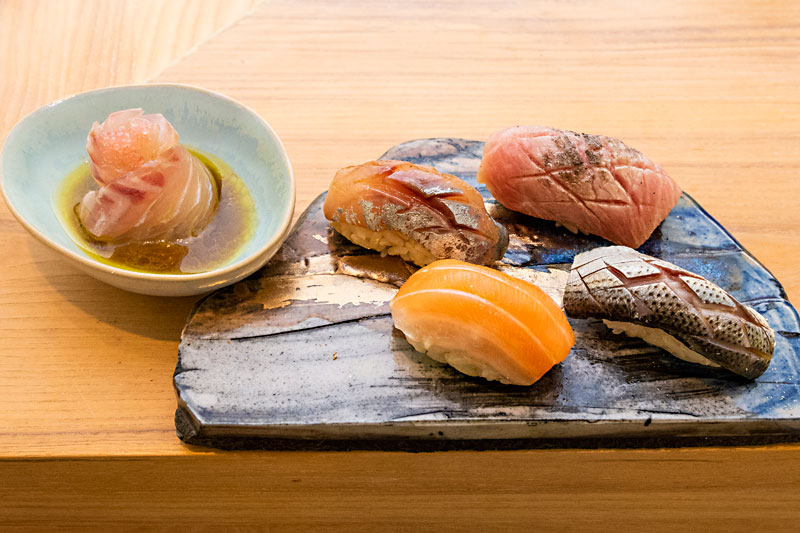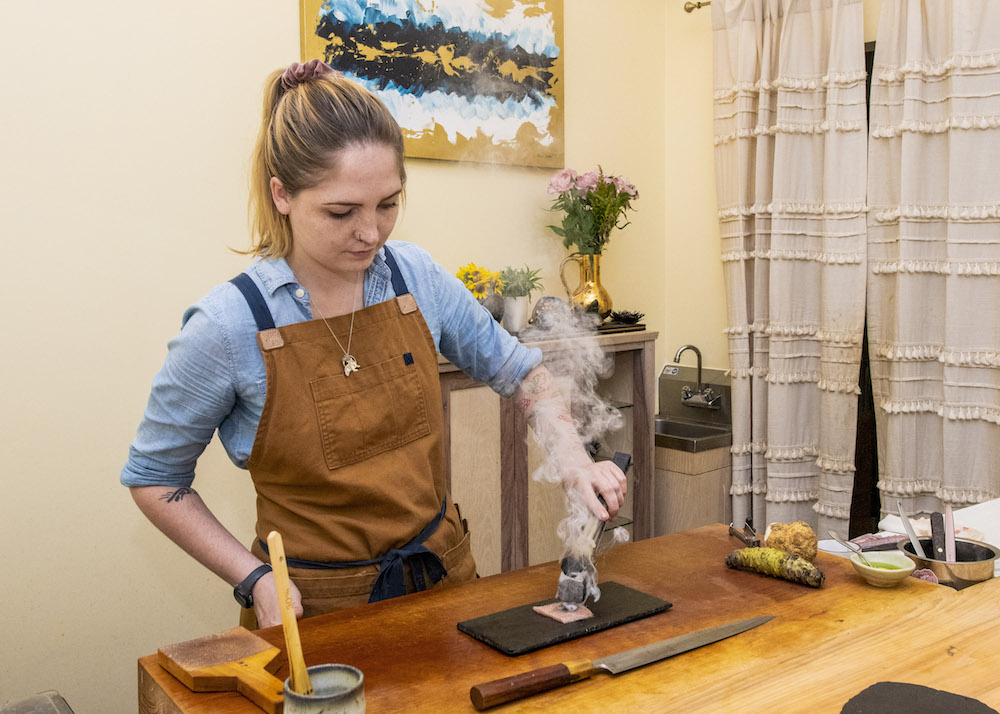Sarah Cook Invites Diners to "Be Here Now" at Kyoten Sushiko
An unlikely artist at Mueller's satellite iteration of Otto Phan's omakase restaurant
By Alexandra Detmar, Fri., June 28, 2019
A handful of years into her culinary odyssey, chef Sarah Cook is practicing the values of purity and harmony impressed upon her by chef Otto Phan. She embarked on her journey as executive chef of Kyōten Sushiko in May, reopening and reinvigorating the six-seat omakase counter, earning her spot despite injury and industry prejudice. Her mentor, Phan, on a confident and unabashed mission toward a Michelin star (or two), now helms the $220-a-pop Kyōten in Chicago. "I offered her this position because it requires a high level of character," said Phan. "Knife skills and sushi skills can be taught by anyone. But I'll only teach someone if they have enough character to see beyond their cutting board. Sarah does."
Phan, a Houston native from a family of Vietnamese immigrants, entered the scene at age 18 and has not faltered since, training under Austin star chefs Takuya Matsumoto and Tatsu Aikawa, and later New York City's legendary three-Michelin-starred Masa Takayama. He eventually returned to Austin to make great sushi out of a trailer, one frequented by local chefs and casual sushi fans alike, and has never been fazed by his somewhat unconventional route: "I've never been a sous chef ... but there are many paths to the top."
Cook's path has been a winding one as well. While completing her Southwestern University philosophy degree and applying to law schools, a comment from her roommate – "Man, you should just cook" – flipped the light switch on Cook's career plans. "The second that someone said it out loud, I could not turn back," she said. "It was the only thing I wanted to do." Later that year, her first-ever stage (at Sway) became the catalyst that would propel her toward professional, high-performance kitchens. "It was just this kinetic energy and this collaborative team sport that I didn't realize kitchens could be," said Cook. Before her departure two years later, she worked her way to lead line positions for both savory and pastry. "The chefs were banks of pastry knowledge and had the kind of formal-but-technical knowledge I needed," she explained. "There is no such thing as a menial kitchen task in my mind, so any opportunity I had to learn something new, I jumped on right away."
Her next stint was at Kuneho (Paul Qui's 2017 restaurant, born and put to rest within 10 months) where her creative scope expanded. "To be able to apply some of those techniques I'd learned at Sway and help to develop the pastry program was something I was really excited to do," said Cook. Chef Mia Li (chef de cuisine of Kuneho) was a great influence. "She was so phenomenal and so wise and talented, with such high standards – just an incredible set of values and leadership. She told me that she would always ask herself, 'Is it fair?' when making decisions, and that has stuck with me."
In the wake of Kuneho's shuttering, Cook was offered the sous chef* position with soon-to-be Sway Rock Rose, but a shoulder injury prevented her from really digging in. It was so bad, in fact, that she was forced to stop working altogether for more than three months, and it was during this time (just over a year ago) that she had her first omakase experience at Kyōten Sushiko. "I was so shocked by the experience. It was a format of food I'd never experienced before," said Cook. "Throughout the meal, Otto was saying what was so sad for him was that he never found his protégé to pass on all of his knowledge and tricks to, and so I struck up a conversation with him during the seating. ... I was familiar enough [with sushi] just from observing at Kuneho. We realized that we had a real connection, philosophically, about why good food is good food, so we stayed in contact afterwards."
When Phan was in a pinch a few weeks later and needed someone to help, Cook went in for a day in early July. "It killed my shoulder, but he wanted me to come back. I felt like, man, I just really stuck a knife in this opportunity that I could have had, because I need to prioritize my health."
When her shoulder was doctor-OK'd, Phan flew back to Austin, and the two sat down for a fateful meeting. "He said, 'Here's the deal: You're taking this spot and we're closing it down,'" said Cook. "It simply came down to the trust factor for him."
To prepare, to focus, to get in the zone, Cook did a stint with Mia Li (then and now at Lenoir), and after hashing out specifics with Phan in fall 2018, spent New Year's to April co-operating Kyōten Chicago, completing an intensive sushi boot camp. "I worked every single day I was in Chicago. We would come in the morning and have master classes on all of these different animals, sauces, and principles, then we'd change clothes into button-downs, run the beverage service, cook in the back kitchen, run the dish pit, then close down the restaurant, go home. I would pass out with my clothes on, wake up, and come back to do it again," said Cook. "You don't have to necessarily wash rice for 10 years, but if you're not going to take a long, extended route, you need to consolidate and compensate appropriately."
Phase two of Phan's world domination plan (an aspiration he openly admits on social media) was opening Kyōten in Mueller in 2016. Though highly regarded as some of the best sushi in town, his dining counter proved too austere for diners hoping for warm hospitality. Once asked by the Chronicle what he wished for his guests to experience, Phan replied, "That's the wrong question to ask." His unapologetic focus has always been on the sushi, from importing his highly exclusive rice varietal and special red vinegars to personally tasting every tongue of uni to bring out the best in each. Phan is always accounting for nature's variation in a manner that is both precise and flexible, once writing, "I LOVE re-accommodating fish," referring to making good use of specific fish brought in by the purveyor, regardless of size or other qualities owing to seasonality or lifestyle (we'll get to that in a moment). He says, "That's kinda what I do here. I enjoy having [Cook] develop her own style and sensibility. No one will be able to surpass me simply by following in my footsteps."
Diners at the revamped Kyōten Sushiko can expect some of the same Otto-specific preparations and elements, like specialty large rice, boquerones-style kohada (gizzard shad), dry-aged A5 wagyu tenderloin nigiri, and the touch of binchotan smoke on various fish. This all exists within the realm of the Edomae tradition, which employs light, customized preservation techniques for each piece of fish, whether cured, smoked, or marinated in soy or vinegar. Where Cook departs from tradition has more to do with the treatment of the fish as an ingredient in her otsumami, or small plates.
Sure, extreme measures are employed to honor each fish – working with specialty purveyors like IMP and Minamoto to provide seasonal variety, offering a sincere thank-you to each animal, and creating a bite customized on several levels (acidity of nigiri rice, preservation and preparation of the fish, complimentary fresh wasabi, and other elements) – but Cook really looks to the local bounty to compose dishes that offer a layered experience. The ocean's bounty is honored, adorned, paid tribute to, or even transformed without being hidden or sullied. While experimenting and having fun with these ingredient-driven plates, Cook seeks harmony in every light smoking (to combat iron qualities in akami tuna), herbal pairing (Mexican mint marigold and purple basil in place of shisho), and garnish (nothing unnecessary; pristine placement affects how the palate perceives the taste).
Partnering with HausBar Farms and patronizing nearby Mueller Farmers' Market, Cook and Leslie Wisnewski (sous chef, server, and all-around hospitality person) honor the best items growers offer. They enjoy the challenge of incorporating progressive details and nontraditional accents into their nightly scallop crudo, taking time to use their senses to construct a fitting set (recently with an hoja santa and bitter sunflower greens sauce, pineapple juice, cedar-aged sake, house mushroom oil, and fresh elderflower). "Every day we fall in love with it, and every day we let it go. We have to open ourselves up to the knowledge that it will be just as good tomorrow, even if we don't know what it will be like. It is an amount of faith we need to have in our purveyors and ingredients – to walk in blind every day and have mystery bags and trust that it's going to be excellent," said Cook.
"It's scary, and you'll drive yourself crazy, but I've learned to not worry about it the night before. It's funny: It ends up being that the things that are best today work together very harmoniously. They fit together nicely. The fish – we try to go hyperseasonal, just get in one fish that is great for this week of the year, and never have it again – oddly enough, the fish that are best today, herbs that are best today, things that are best today tend to have a kind of commonality to them, a natural harmony, that we're able to trust the ingredients and give them as much respect as possible and know that they will really sing together."
Cook also puts great stock into the importance of recycling ingredients at all steps possible, folding uni scraps into meringue, transforming too-small-for-nigiri kohada into a savory, pickle-y paste for the base of A5 wagyu lettuce cups with fish caramel, chili-toasted rice powder, and shaved honey-cured duck egg. "We're finding the best way to celebrate the 'trash ingredients' and showcase that they're not trash. There's no such thing as a 'good' or a 'bad' kohada."
Cook keeps Be Here Now (all-religion-in-one, but no-religion-at-once, 1971 Zen spiritual manual) on Kyōten's waiting room coffee table, a space brought to life with plants, a hanging chair, handmade wall art, and even an experimental mushroom log. It feels spa-like, a place you could stay awhile and leave feeling renewed. The book is both her and Wisnewski's philosophy. "There's a part that says something like, 'We're gonna live, wow, how amazing; we're gonna die, wow, how amazing. Look at the flower in that tree, wow, how amazing; look at that garbage, wow, how amazing.' [It's] this idea that everything is valuable and worth being shown love, and even though I don't have a lot of control over what's happening in our oceans, treating any product that comes in here with the utmost reverence is the best that we can do," said Cook. "We joke that 'all fish go to heaven' here, because we try to do the best by them, research their lifestyles. It informs how we handle them, how we season them."
Whether or not you have a personal taste for fish, Cook's existence and success in this space is something to behold. North America's paucity of female sushi chefs is scarcely better than Japan's. If it isn't sexist kitchen culture that repels women ("I finally decided to shave my head so nobody would ever ask me if I was willing to tie my hair back during an interview again! I'm like, 'Of course I am, it's a job!'"), perhaps it is the cultural expectations of diners: "There's a lot of things people say that they don't realize are sexist, like, 'Who sharpens your knives for you?' 'Where's the real chef?' 'Who actually butchers your fish?' and, 'Where are the men?'" said Cook. "I said to one guest, 'I am the men, you're looking right at 'em!'"
In a 2011 interview with The Wall Street Journal, Jiro Ono's oldest son, sous chef of Sukiyabashi Jiro (Jiro Dreams of Sushi), claimed that women cannot be sushi chefs due to the "imbalance in their taste" that the menstrual cycle causes. Between that, the "warm hands theory," and an ongoing disbelief that pretty women can execute their work as seriously and as consistently as male chefs, Cook hasn't exactly been on a cakewalk. "There was a make-or-break moment I had for myself where I had to decide how I would handle sexism if I wanted to be in this industry. I would put my head down and outwork anybody else I worked with. I will work harder than you. I don't need to even directly respond to this, I'll just prove it, and show that I deserve to be here. It is exhausting and frustrating to have to validate yourself in a way that other people do not, but that formative decision shaped the way that I handle conflict from there on," explained Cook. "I feel so incredibly fortunate to have the platform that I have. This is what women in this field are experiencing. I'm here to provide a point of access for women who want to do this."
"Sushi bars have been places with a lot of chauvinistic, almost ganglike mentality," said Phan. "That's slowly changing, and that's a good thing. A woman seeking to learn sushi, particularly at a level this high, is near impossible without a relentless and unfair amount of sacrifice. But Sarah is a very determined person. And she fell into a good opportunity. And while Sarah has had a very difficult path because she's a woman, she isn't vindictive about it. She's handled her unfair obstacles with a lot of grace, and that's what makes her special. She just really loves what she does and just wants to earn her own merit based on excellence."
While the relatively small world of still-traditional Japanese cuisine might not be the first or last front of great political change on a global scale, we ought to appreciate the bravery of chefs who break through the gatekeeper rhetoric to make the culinary world a richer place, to claim their own space within it, and to excel.
Sarah Cook is stripping sushi culture of its intimidating character for guests at Kyōten Sushiko by reservation only, but don't let that scare you away. A humble, relative newcomer to sushi herself, she shares her excitement for the craft and respect toward nature with each guest, holding with certain traditions while also synthesizing some new ones of her own. Expect 14-20 small courses, thoughtful touches during the seating – the smaller the group, the better – and some magical demonstrations. Put your trust in an unlikely artist and say, "Omakase," or, "I leave it up to you."
[Editor's note: We corrected the position Cook was offered at Sway.]
Kyōten Sushiko
4600 Mueller Blvd., www.kyotensushiko.comWed.-Sun., 6 & 8:30pm, reservations only











